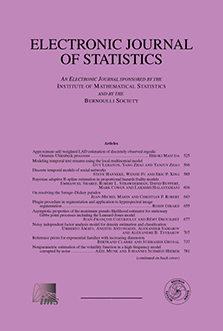Abstract
Respondent-Driven Sampling (RDS) is a widely adopted link-tracing sampling design used to draw valid statistical inference from samples of populations for which there is no available sampling frame. RDS estimators rely upon the assumption that each edge (representing a relationship between two individuals) in the underlying network has an equal probability of being sampled. We show that this assumption is violated in even the simplest cases, and that RDS estimators are sensitive to the violation of this assumption.
Citation
Miles Q. Ott. Krista J. Gile. "Unequal edge inclusion probabilities in link-tracing network sampling with implications for Respondent-Driven Sampling." Electron. J. Statist. 10 (1) 1109 - 1132, 2016. https://doi.org/10.1214/16-EJS1138
Information





